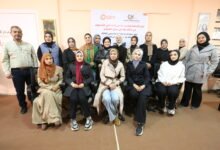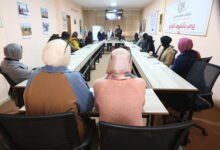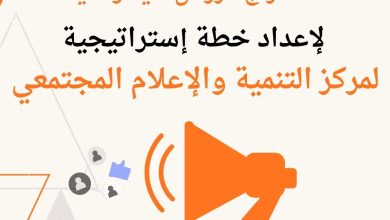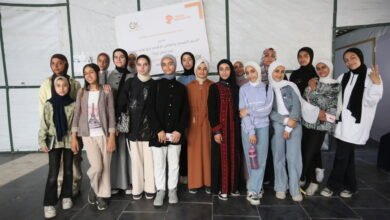Between Rafah and Tel al-Turmus, a River of Blood That Has Not Yet Dried
Between Rafah and Tel al-Turmus, a River of Blood That Has Not Yet Dried
I remember my father in our old house in the Al-Shaboura camp, lying on his bed after illness left him bedridden. I held a bouquet of red roses and, on a winter night, placed them in his lap to make him smile. I took a picture; his face looked like a rose uprooted from its land many ages ago, mirroring his age, wrapped in the woollen cap he never removed except in summer’s heat. He flustered at the phone’s flash. He seemed still a young man running from exploding barrel bombs dropped on the displaced, forced along in search of safety from their original Palestinian villages and cities.
The light gleamed in his eyes as he slipped into a narration of the distant past, alive with pain in his heart and soul. I stared at the multi-layered paint on the camp wall where we sat. Gesturing, he said, “I see there on the wall the faces of my mother and father, sitting in front of the harvest sacks, counting the year’s yield, working day and night; so I joined them early.” He paused, pointing upward: “There … the big star shining. That was my star in my village, Tel al-Turmus”.
I stared at the wall and saw the Nakba my parents lived through, while I was born in the camp, surviving massacres, the worst of which was the Deir Yassin Massacre.
My father stopped speaking and stared at the paint peeling like raindrops from the wall! I never understood why he sometimes stopped telling the narrative the story I and my generation needed to know.
Confession: A Cave of Sorrows Where My Father’s Past Meets My Present!
I respected that silence for many long days, as he no longer wished to speak. I was too young then to understand how painful it is to speak of all one has lived through, be it pain, loss, displacement, or expulsion. Now, after living through the genocide of thousands in Gaza, I understand why my father fell silent, staring at the worn wall. It was like falling into an infinite void, weightless, drifting between galaxies, seeking a hand, a word, or a miracle to return to one’s self; the self slaughtered before your eyes. Past, present, and future hang on a star’s glimmer, hoping for an embrace to bring you back!
Gaza now is lost, slaughtered, drowning in a sea of blood; just as our villages and cities drowned in the Nakba of ’48, now named the First Nakba because none know a more monstrous one awaited.
I return to my tireless attempts with my father and his memories of the first Nakba. One day, tears poured from his eyes like rain, so I recorded every word, unsure when he might speak again:
“We walked days, barely breathing. Your mother, siblings, and I fled at dawn with house keys only. We trembled fearing gangs burning houses with people inside, destroying fields, killing children, women, elderly; they executed families in cold blood, spreading terror. We had only farming tools and school notebooks. News came from neighboring villages of nearby attacks. We thought someone would protect us. We locked the harvest, took children, and ran with only clothes and food. ‘Just a few days; justice will come’ we said. We walked through Tel al-Safi to northern Gaza outskirts, weary with hunger, thirst, and fear. Our children cried, but we kept walking, some stayed in Gaza, but I wasn’t reassured. We walked south to Rafah.”
I interrupted him: Father, why didn’t you stop?!
He straightened, ignoring my naivety:
“We fled death; no safety remained. I took your siblings and your mother to Rafah. If there had been a farther city, I would not have kept walking. Watch my family killed, powerless, is unbearable.”
I bowed my head, feeling I disrespected his immense pain. He stopped speaking again.
The Eyes See, but the Fire in the Heart Never Goes Out
Since childhood, I’d drunk in my father’s Nakba stories and Israeli massacres. I teased: “You ran away!” He said nothing, but once, he muttered, “the one whose hand is in water is not like the one whose hand is in fire.”
Only now do I truly understand: our hands and hearts are in the fire. Everyone in Gaza burns a thousand times daily; inside or out. There’s no escape. No Palestinian, human with a heart, can endure watching tens of children killed daily. We all burn. Our Gaza Nakba is the mother of all Nakbas.
Now I live every word my father recalled of 1948. It haunts Palestinians: bare scenes of slaughter and blood. Gaza’s destruction is unprecedented, and worse, it continues before the “international” world’s eyes; silent and complicit. They besiege our lives, voices, and actions, as if we were aliens, as if we don’t own this land assassinated and emptied of its people. Gaza embraced all displaced; neighbors from Jaffa, others from Hamama, Zarnuqa, Isdud, and others from Lydda, Haifa, Ramla, al-Qastina, and more.
History is repeating itself. Gaza, once refuge, is now slaughtered. They call us “Gazans.” Even original Gaza citizens perish equally; in killing, destruction, torture, starvation, thirst, siege, and endless fear. We are ground like wheat. No house, hospital, school, church, mosque, sea, or dabke remains. On the anniversary of our First Nakba, we stare into the unknown, dozing like the dead, awaiting life’s return.
On the Pledge, Father!
My father was forced from Tel al-Turmus, a Gaza district villages with 760 people in 1945. Nestled on a small coastal hill in Wadi al-Marj to the south, it was connected by dirt roads to villages and the main road to al-Majdal. Established over a century ago, its residents farmed grains, vegetables, citrus and bananas.
Born, married, and fathering my older siblings there, he was forced to live in al-Shaboura refugee camp in Rafah, fleeing Israeli occupation brutality. I grew up in Rafah, my father’s refuge choice. He died dreaming of our return. Once passing near Tel al-Turmus on a Jerusalem trip, he pointed from the bus: “Here I was born, my daughter. Here we lived a simple, beautiful life.”
His eyes drowned in tears and pain. He spoke of it and longed for it until death in al-Shaboura camp in Rafah. I inherited exile as his daughter, breathing stories of displacement with my first breath, living caught between Rafah and Gaza City; working daily the latter but preferring the former. My extended family remains in Rafah, caught between displacement and private grief.
My father never learned that Rafah is now declared Israeli land, destroyed and still decimated. He never knew Israeli pursued him even in his refuge, or that they destroyed the camp house holding our memories and dreams of return. I had no time to tell him they demolished the house he and my mother built with their own hands, to protect us!
I did no time to preserve his grave after Israeli tanks desecrated his and my mother’s tombstones. I cannot tell him my sorrow, rage, and pain for failing to protect his grave, his house, or his memories. I cannot tell him I have been displaced to a foreign land I neither know or love. My heart burns with longing for Rafah, Gaza, Tel al-Turmus, and from the fresh river of blood flowing from thousands of martyrs. But I promise to protect his story and keep telling it to generations yet to come.
Hedaya Shamun,A Palestinian writer and journalist from the Gaza Strip.






